39 start with H start with H

Public silence in policymaking can be deafening. When advocates for a disadvantaged group decline to speak up, not only are their concerns not recorded or acted upon, but also the collective strength of the unspoken argument is lessened—a situation that undermines the workings of deliberative democracy by reflecting only the concerns of more powerful interests.
But why do so many advocates remain silent on key issues they care about and how does that silence contribute to narrowly defined policies? What can individuals and organizations do to amplify their privately expressed concerns for policy change?
In Healthy Voices, Unhealthy Silence, Colleen M. Grogan and Michael K. Gusmano address these questions through the lens of state-level health care advocacy for the poor. They examine how representatives for the poor participate in an advisory board process by tying together existing studies; extensive interviews with key players; and an in-depth, first-hand look at the Connecticut Medicaid advisory board's deliberations during the managed care debate. Drawing on the concepts of deliberative democracy, agenda setting, and nonprofit advocacy, Grogan and Gusmano reveal the reasons behind advocates' often unexpected silence on major issues, assess how capable nonprofits are at affecting policy debates, and provide prescriptive advice for creating a participatory process that adequately addresses the health care concerns of the poor and dispossessed.
Though exploring specifically state-level health care advocacy for the poor, the lessons Grogan and Gusmano offer here are transferable across issue areas and levels of government. Public policy scholars, advocacy organizations, government workers, and students of government administration will be well-served by this significant study.
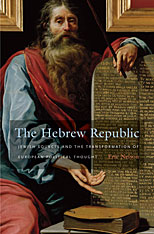
According to a commonplace narrative, the rise of modern political thought in the West resulted from secularization—the exclusion of religious arguments from political discourse. But in this pathbreaking work, Eric Nelson argues that this familiar story is wrong. Instead, he contends, political thought in early-modern Europe became less, not more, secular with time, and it was the Christian encounter with Hebrew sources that provoked this radical transformation.
During the sixteenth and seventeenth centuries, Christian scholars began to regard the Hebrew Bible as a political constitution designed by God for the children of Israel. Newly available rabbinic materials became authoritative guides to the institutions and practices of the perfect republic. This thinking resulted in a sweeping reorientation of political commitments. In the book’s central chapters, Nelson identifies three transformative claims introduced into European political theory by the Hebrew revival: the argument that republics are the only legitimate regimes; the idea that the state should coercively maintain an egalitarian distribution of property; and the belief that a godly republic would tolerate religious diversity. One major consequence of Nelson’s work is that the revolutionary politics of John Milton, James Harrington, and Thomas Hobbes appear in a brand-new light.
Nelson demonstrates that central features of modern political thought emerged from an attempt to emulate a constitution designed by God. This paradox, a reminder that while we may live in a secular age, we owe our politics to an age of religious fervor, in turn illuminates fault lines in contemporary political discourse.
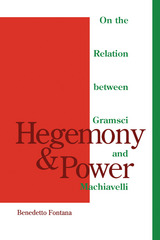
Presents a comparative and textual exploration of Gramsci's interpretation of Machiavelli's political analyses. This valuable contribution to our understanding of Gramsci includes a comparison of the major Machiavellian ideas such as the nature of political knowledge, the new principality, the concept of the people, and the relation between thought and action, to Gramsci's concepts of hegemony, moral and intellectual reform, and the collective will.
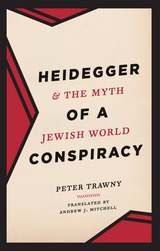
While Heidegger’s affiliation with National Socialism is well known, the anti-Semitic dimension of that engagement could not be fully told until now. Trawny traces Heidegger’s development of a grand “narrative” of the history of being, the “being-historical thinking” at the center of Heidegger’s work after Being and Time. Two of the protagonists of this narrative are well known to Heidegger’s readers: the Greeks and the Germans. The world-historical antagonist of this narrative, however, has remained hitherto undisclosed: the Jews, or, more specifically, “world Judaism.” As Trawny shows, world Judaism emerges as a racialized, destructive, and technological threat to the German homeland, indeed, to any homeland whatsoever. Trawny pinpoints recurrent, anti-Semitic themes in the Notebooks, including Heidegger’s adoption of crude cultural stereotypes, his assigning of racial reasons to philosophical decisions (even undermining his Jewish teacher, Edmund Husserl), his endorsement of a Jewish “world conspiracy,” and his first published remarks on the extermination camps and gas chambers (under the troubling aegis of a Jewish “self-annihilation”). Trawny concludes with a thoughtful meditation on how Heidegger’s achievements might still be valued despite these horrifying facets. Unflinching and systematic, this is one of the most important assessments of one of the most important philosophers in our history.
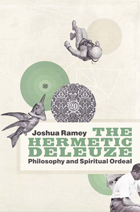
Identifying key hermetic moments in Deleuze's thought, including his theories of art, subjectivity, and immanence, Ramey argues that the philosopher's work represents a kind of contemporary hermeticism, a consistent experiment in unifying thought and affect, percept and concept, and mind and nature in order to engender new relations between knowledge, power, and desire. By uncovering and clarifying the hermetic strand in Deleuze's work, Ramey offers both a new interpretation of Deleuze, particularly his insistence that the development of thought demands a spiritual ordeal, and a framework for retrieving the pre-Kantian paradigm of philosophy as spiritual practice.
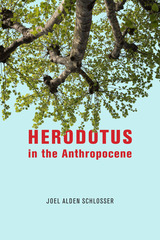
Schlosser shows that the Histories, which chronicle the interactions among the Greek city-states and their neighbors that culminated in the Persian Wars, illuminate a telling paradox: at those times when humans appear capable of exerting more influence than ever before, they must also assert collective agency to avoid their own downfall. Here, success depends on nomoi, or the culture, customs, and laws that organize human communities and make them adaptable through cooperation. Nomoi arise through sustained contact between humans and their surroundings and function best when practiced willingly and with the support of strong commitments to the equality of all participants. Thus, nomoi are the very substance of political agency and, ultimately, the key to freedom and ecological survival because they guide communities to work together to respond to challenges. An ingenious contribution to political theory, political philosophy, and ecology, Herodotus in the Anthropocene reminds us that the best perspective on the present can often be gained through the lens of the past.
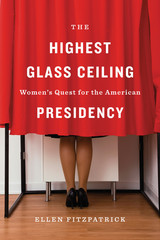
In The Highest Glass Ceiling, best-selling historian Ellen Fitzpatrick tells the story of three remarkable women who set their sights on the American presidency. Victoria Woodhull (1872), Margaret Chase Smith (1964), and Shirley Chisholm (1972) each challenged persistent barriers confronted by women presidential candidates. Their quest illuminates today’s political landscape, showing that Hillary Clinton’s 2016 campaign belongs to a much longer, arduous, and dramatic journey.
The tale begins during Reconstruction when the radical Woodhull became the first woman to seek the presidency. Although women could not yet vote, Woodhull boldly staked her claim to the White House, believing she might thereby advance women’s equality. Republican Senator Margaret Chase Smith came into political office through the “widow’s mandate.” Among the most admired women in public life when she launched her 1964 campaign, she soon confronted prejudice that she was too old (at 66) and too female to be a creditable presidential candidate. She nonetheless became the first woman to have her name placed in nomination for President by a major party. Democratic Congresswoman Shirley Chisholm ignored what some openly described as the twin disqualifications of race and gender in her spirited 1972 presidential campaign. She ran all the way to the Democratic convention, inspiring diverse followers and angering opponents, including members of the Nixon administration who sought to derail her candidacy.
As The Highest Glass Ceiling reveals, women’s pursuit of the Oval Office, then and now, has involved myriad forms of influence, opposition, and intrigue.

Hellenistic history.
The historian Polybius (ca. 200–118 BC) was born into a leading family of Megalopolis in the Peloponnese (Morea) and served the Achaean League in arms and diplomacy for many years, favoring alliance with Rome. From 168 to 151 he was held hostage in Rome, where he became a friend of Lucius Aemilius Paulus and his two sons, especially Scipio Aemilianus, whose campaigns, including the destruction of Carthage, he later attended. Late in his life he became a trusted mediator between Greece and the Romans; helped in the discussions that preceded the final war with Carthage; and after 146 was entrusted by the Romans with the details of administration in Greece.
Polybius’ overall theme is how and why the Romans spread their power as they did. The main part of his history covers the years 264–146 BC, describing the rise of Rome, her destruction of Carthage, and her eventual domination of the Greek world. It is a great work: accurate, thoughtful, largely impartial, based on research, and full of insight into customs, institutions, geography, the causes of events, and the character of peoples. It is a vital achievement of the first importance despite the incomplete state in which all but the first five of its original forty books have reached us.
For this edition, W. R. Paton’s excellent translation, first published in 1922, has been thoroughly revised, the Büttner-Wobst Greek text corrected, and explanatory notes and a new introduction added, all reflecting the latest scholarship.
The Loeb Classical Library edition of Polybius is in six volumes.

Hellenistic history.
The historian Polybius (ca. 200–118 BC) was born into a leading family of Megalopolis in the Peloponnese (Morea) and served the Achaean League in arms and diplomacy for many years, favoring alliance with Rome. From 168 to 151 he was held hostage in Rome, where he became a friend of Lucius Aemilius Paulus and his two sons, especially Scipio Aemilianus, whose campaigns, including the destruction of Carthage, he later attended. Late in his life he became a trusted mediator between Greece and the Romans; helped in the discussions that preceded the final war with Carthage; and after 146 was entrusted by the Romans with the details of administration in Greece.
Polybius’ overall theme is how and why the Romans spread their power as they did. The main part of his history covers the years 264–146 BC, describing the rise of Rome, her destruction of Carthage, and her eventual domination of the Greek world. It is a great work: accurate, thoughtful, largely impartial, based on research, and full of insight into customs, institutions, geography, the causes of events, and the character of peoples. It is a vital achievement of the first importance despite the incomplete state in which all but the first five of its original forty books have reached us.
For this edition, W. R. Paton’s excellent translation, first published in 1922, has been thoroughly revised, the Büttner-Wobst Greek text corrected, and explanatory notes and a new introduction added, all reflecting the latest scholarship.
The Loeb Classical Library edition of Polybius is in six volumes.
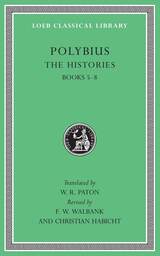
Hellenistic history.
The historian Polybius (ca. 200–118 BC) was born into a leading family of Megalopolis in the Peloponnese (Morea) and served the Achaean League in arms and diplomacy for many years, favoring alliance with Rome. From 168 to 151 he was held hostage in Rome, where he became a friend of Lucius Aemilius Paulus and his two sons, especially Scipio Aemilianus, whose campaigns, including the destruction of Carthage, he later attended. Late in his life he became a trusted mediator between Greece and the Romans; helped in the discussions that preceded the final war with Carthage; and after 146 was entrusted by the Romans with the details of administration in Greece.
Polybius’ overall theme is how and why the Romans spread their power as they did. The main part of his history covers the years 264–146 BC, describing the rise of Rome, her destruction of Carthage, and her eventual domination of the Greek world. It is a great work: accurate, thoughtful, largely impartial, based on research, and full of insight into customs, institutions, geography, the causes of events, and the character of peoples. It is a vital achievement of the first importance despite the incomplete state in which all but the first five of its original forty books have reached us.
For this edition, W. R. Paton’s excellent translation, first published in 1922, has been thoroughly revised, the Büttner-Wobst Greek text corrected, and explanatory notes and a new introduction added, all reflecting the latest scholarship.
The Loeb Classical Library edition of Polybius is in six volumes.
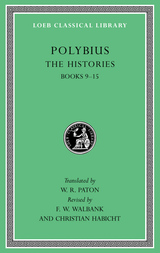
Hellenistic history.
The historian Polybius (ca. 200–118 BC) was born into a leading family of Megalopolis in the Peloponnese (Morea) and served the Achaean League in arms and diplomacy for many years, favoring alliance with Rome. From 168 to 151 he was held hostage in Rome, where he became a friend of Lucius Aemilius Paulus and his two sons, especially Scipio Aemilianus, whose campaigns, including the destruction of Carthage, he later attended. Late in his life he became a trusted mediator between Greece and the Romans; helped in the discussions that preceded the final war with Carthage; and after 146 was entrusted by the Romans with the details of administration in Greece.
Polybius’ overall theme is how and why the Romans spread their power as they did. The main part of his history covers the years 264–146 BC, describing the rise of Rome, her destruction of Carthage, and her eventual domination of the Greek world. It is a great work: accurate, thoughtful, largely impartial, based on research, and full of insight into customs, institutions, geography, the causes of events, and the character of peoples. It is a vital achievement of the first importance despite the incomplete state in which all but the first five of its original forty books have reached us.
For this edition, W. R. Paton’s excellent translation, first published in 1922, has been thoroughly revised, the Büttner-Wobst Greek text corrected, and explanatory notes and a new introduction added, all reflecting the latest scholarship.
The Loeb Classical Library edition of Polybius is in six volumes.
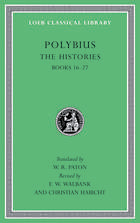
Hellenistic history.
The historian Polybius (ca. 200–118 BC) was born into a leading family of Megalopolis in the Peloponnese (Morea) and served the Achaean League in arms and diplomacy for many years, favoring alliance with Rome. From 168 to 151 he was held hostage in Rome, where he became a friend of Lucius Aemilius Paulus and his two sons, especially Scipio Aemilianus, whose campaigns, including the destruction of Carthage, he later attended. Late in his life he became a trusted mediator between Greece and the Romans; helped in the discussions that preceded the final war with Carthage; and after 146 was entrusted by the Romans with the details of administration in Greece.
Polybius’ overall theme is how and why the Romans spread their power as they did. The main part of his history covers the years 264–146 BC, describing the rise of Rome, her destruction of Carthage, and her eventual domination of the Greek world. It is a great work: accurate, thoughtful, largely impartial, based on research, and full of insight into customs, institutions, geography, the causes of events, and the character of peoples. It is a vital achievement of the first importance despite the incomplete state in which all but the first five of its original forty books have reached us.
For this edition, W. R. Paton’s excellent translation, first published in 1922, has been thoroughly revised, the Büttner-Wobst Greek text corrected, and explanatory notes and a new introduction added, all reflecting the latest scholarship.
The Loeb Classical Library edition of Polybius is in six volumes.
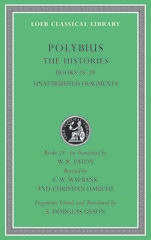
Hellenistic history.
The historian Polybius (ca. 200–118 BC) was born into a leading family of Megalopolis in the Peloponnese (Morea) and served the Achaean League in arms and diplomacy for many years, favoring alliance with Rome. From 168 to 151 he was held hostage in Rome, where he became a friend of Lucius Aemilius Paulus and his two sons, especially Scipio Aemilianus, whose campaigns, including the destruction of Carthage, he later attended. Late in his life he became a trusted mediator between Greece and the Romans; helped in the discussions that preceded the final war with Carthage; and after 146 was entrusted by the Romans with the details of administration in Greece.
Polybius’ overall theme is how and why the Romans spread their power as they did. The main part of his history covers the years 264–146 BC, describing the rise of Rome, her destruction of Carthage, and her eventual domination of the Greek world. It is a great work: accurate, thoughtful, largely impartial, based on research, and full of insight into customs, institutions, geography, the causes of events, and the character of peoples. It is a vital achievement of the first importance despite the incomplete state in which all but the first five of its original forty books have reached us.
For this edition, W. R. Paton’s excellent translation, first published in 1922, has been thoroughly revised, the Büttner-Wobst Greek text corrected, and explanatory notes and a new introduction added, all reflecting the latest scholarship.
The Loeb Classical Library edition of Polybius is in six volumes.
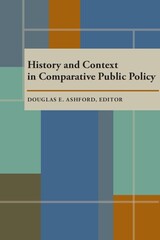
Douglas E. Ashford joins a growing number of scholars who have questioned the behavioralist assumptions of much policy science. The essays in this volume show why policy analysis cannot be confined to prevailing methods of social science. Policy-making behavior involves historical, contextual, and philosophical factors that also raise critical questions about the concepts and theory of the discipline. Ashford asks difficult questions about the contextual, conjunctural, and unintentional circumstances that affect actual decision-making. His bridging essays summarize opposing viewpoints and conflicting interpretations to help form a new agenda for comparative policy analysis.
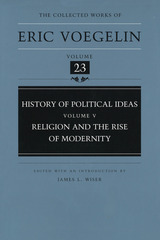
Examining the emergence of modernity within the philosophical and political debates of the sixteenth century, Religion and the Rise of Modernity resumes the analysis of the "great confusion" introduced in Volume IV of History of Political Ideas. Encompassing a vast range of events ignited by Luther's Ninety-Five Theses, this period is one of controversy, revolution, and partiality.
Despite the era's fragmentation and complexity, Voegelin's insightful analysis clarifies its significance and suggests the lines of change converging at a point in the future: the medieval Christian understanding of a divinely created closed cosmos was being replaced by a distinctly modern form of human consciousness that posits man as the proper origin of meaning in the universe.
Analyzing the most significant features of the great confusion, Voegelin examines a vast range of thought and issues of the age. From the more obvious thinkers to those less frequently studied, this volume features such figures as Calvin, Althusius, Hooker, Bracciolini, Savonarola, Copernicus, Tycho de Brahe, and Giordano Bruno. Devoting a considerable amount of attention to Jean Bodin, Voegelin presents him as a prophet of a new, true religion amid the civilizational disorder of the post-Christian era. Focusing on such traditional themes as monarchy, just war theory, and the philosophy of law, this volume also investigates issues within astrology, cosmology, and mathematics.
Religion and the Rise of Modernity is a valuable work of scholarship not only because of its treatment of individual thinkers and doctrines influential in the sixteenth century and beyond but also because of its close examination of those experiences that formed the modern outlook.
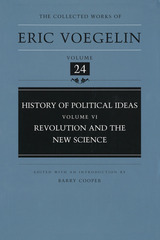
Volume VI of Voegelin's account of the history of Western political ideas continues from the point reached in the previous volume with the study of the mystic-philosopher Jean Bodin. Voegelin begins with a discussion of the conflict between Bishop Bossuet and Voltaire concerning the relationship between what is conventionally identified as sacred history and profane history. Bossuet maintained the traditional Christian position, the origin of which may be traced to Saint Augustine's City of God. Voegelin shows, however, that while Bossuet may have been heir to an adequate understanding of human existence, Voltaire drew attention to a series of historical facts, such as the comparative size of the Russian and Roman empires, the existence of Chinese civilization, and the discovery of the New World, that could be incorporated into Bossuet's account only with great difficulty or not at all.
For the first time, the theoretical problem of the historicity of evocative symbols of political order becomes the focus of Voegelin's analysis. This major problem, which found a provisional solution in the New Science of Vico, was intertwined with several additional ones that may be summarized in terms of an increasing closure toward what Voegelin calls the world- transcendent ground of reality. Voegelin traces the consequences of the new attitudes and sentiments in terms of an increasing disorientation in personal, social, and political life, a disorientation that was expressed in increasingly impoverished experiences and accounts of history and of nature.
Vico represents the great exception to this decline in the intellectual adequacy of modern political ideas and modern self- understanding. Readers familiar with Voegelin's New Science of Politics will find in the long, challenging, and brilliant chapter on Vico and his New Science one of the major textual analyses that sustained Voegelin's entire intellectual enterprise. Indeed, the chapter on Vico, along with similarly provocative and insightful chapters on Bodin and on Schelling in other volumes, may almost be read as an element of Voegelin's own spiritual autobiography.
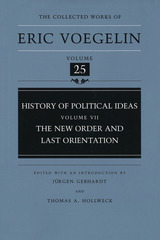
In The New Order and Last Orientation, Eric Voegelin explores two distinctly different yet equally important aspects of modernity. He begins by offering a vivid account of the political situation in seventeenth-century Europe after the decline of the church and the passing of the empire. Voegelin shows how the intellectual and political disorder of the period was met by such seemingly disparate responses as Grotius's theory of natural right, Hobbes's Leviathan, the role of the Fronde in the formation of the French national state, Spinoza's Tractatus Theologico-Politicus, and Locke's Second Treatise, the blueprint of a modern middle-class society. By putting these responses and the thought of Montesquieu, Hume, and others in the context of the birth pains of the national state and the emergence of a new self-understanding of man, Voegelin achieves a brilliant mixture of political history and profound philosophical analysis.
Voegelin's verdict of modernity is pronounced most powerfully in the opening part of "Last Orientation," in the chapter entitled "Phenomenalism." His discussion of the intellectual confusion underlying the modern project of scientistic phenomenalism is the most original criticism leveled against modernity to date. It is at the same time the first step toward a recovery of reality through philosophy conceived as a science of substance in the spirit of Giordano Bruno. Voegelin's first example of such an effort at recovering reality is the chapter on Schelling, one of the spiritual realists who has not been affected by the prevailing rationalist or reductionist creeds that are part of the modern disorder. Schelling's indirect yet powerful influence on Schopenhauer, Nietzsche, and Freud more than justifies Voegelin's interest in his philosophy and character, even though Voegelin would later distance himself from some of Schelling's positions.
The volume's concluding chapter, "Nietzsche and Pascal," applies the understanding gained from the study of Schelling to the thought of the most powerful critic of the age, Nietzsche. Nietzsche's self-avowed affinity with Pascal provides the key to an analysis of the strengths and weaknesses of his thought and reaffirms the connection that links the beginning of modernity with its most recent crises and the efforts to overcome them.

Reaching into our own time, Crisis and the Apocalypse of Man confronts the disintegration of traditional sources of meaning and the correlative attempt to generate new sources of order from within the self. Voegelin allows us to contemplate the crisis in its starkest terms as the apocalypse of man that now seeks to replace the apocalypse of God. The totalitarian upheaval that convulsed Voegelin's world, and whose aftermath still defines ours, is only the external manifestation of an inner spiritual turmoil. Its roots have been probed throughout the eight volumes of History of Political Ideas, but its emergence is marked by the age of Enlightenment.
In our postmodern era, discussions of the collapse of the "enlightenment project" have become commonplace. Voegelin compels us to follow the great-souled individuals who sought to go from disintegration of the present toward evocations of order for the future. Such thinkers as Comte, Bakunin, and Marx suffered through the crisis and fully understood the need for a new outpouring of the spirit. They resolved to supply the deficiency themselves. As a consequence they launched us irrevocably on the path of the apocalypse of man.
One of the great merits of Voegelin's analysis is his exposition of the pervasive character of this crisis. It is not confined to the megalomaniacal dreamers of a revolutionary apocalypse; rather, echoes of it are found in the more moderate Enlightenment preoccupation with progress to be attained through application of the scientific method. Faith in the capacity of instrumental reason to answer the ultimate questions of human existence defined men such as Voltaire, Helvétius, Diderot, D'Alembert, and Condorcet. It remains the authoritative faith of our world today, Voegelin argues, demonstrated by our continuing inability to step outside the parameters of the Enlightenment. Are we condemned, then, to oscillate between the rational incoherence of a science that never delivers on its promises and a now discredited revolutionary idealism that wreaks havoc in practice? This is the question toward which Voegelin's final volume points. While not direct, his response is evident everywhere. Crisis and the Apocalypse of Man could have been written only by a man who had reached his own resolution of the crisis.

Classic political realism.
Thucydides of Athens was born about 471 BC. He saw the rise of Athens to greatness under the inspired leadership of Pericles. In 430, the second year of the Peloponnesian War, he caught and survived the horrible plague that he described so graphically. Later, as general in 423 he failed to save Amphipolis from the enemy and was disgraced. He tells us about this, not in volumes of self-justification, but in one sentence of his history of the war—that it befell him to be an exile for twenty years. He then lived probably on his property in Thrace, but was able to observe both sides in certain campaigns of the war, and returned to Athens after her defeat in 404. He had been composing his famous history, with its hopes and horrors, triumphs and disasters, in full detail from first-hand knowledge, along with the accounts of others.
The war was really three conflicts with one uncertain peace after the first; and Thucydides had not unified them into one account when death came sometime before 396. His history of the first conflict, 431–421, was nearly complete; Thucydides was still at work on this when the war spread to Sicily and into a conflict (415–413) likewise complete in his awful and brilliant record, though not fitted into the whole. His story of the final conflict of 413–404 breaks off (in the middle of a sentence) when dealing with the year 411. So his work was left unfinished and as a whole unrevised. Yet in brilliance of description and depth of insight this history has no superior.
The Loeb Classical Library edition of Thucydides is in four volumes.

Classic political realism.
Thucydides of Athens was born about 471 BC. He saw the rise of Athens to greatness under the inspired leadership of Pericles. In 430, the second year of the Peloponnesian War, he caught and survived the horrible plague that he described so graphically. Later, as general in 423 he failed to save Amphipolis from the enemy and was disgraced. He tells us about this, not in volumes of self-justification, but in one sentence of his history of the war—that it befell him to be an exile for twenty years. He then lived probably on his property in Thrace, but was able to observe both sides in certain campaigns of the war, and returned to Athens after her defeat in 404. He had been composing his famous history, with its hopes and horrors, triumphs and disasters, in full detail from first-hand knowledge, along with the accounts of others.
The war was really three conflicts with one uncertain peace after the first; and Thucydides had not unified them into one account when death came sometime before 396. His history of the first conflict, 431–421, was nearly complete; Thucydides was still at work on this when the war spread to Sicily and into a conflict (415–413) likewise complete in his awful and brilliant record, though not fitted into the whole. His story of the final conflict of 413–404 breaks off (in the middle of a sentence) when dealing with the year 411. So his work was left unfinished and as a whole unrevised. Yet in brilliance of description and depth of insight this history has no superior.
The Loeb Classical Library edition of Thucydides is in four volumes.

Classic political realism.
Thucydides of Athens was born about 471 BC. He saw the rise of Athens to greatness under the inspired leadership of Pericles. In 430, the second year of the Peloponnesian War, he caught and survived the horrible plague that he described so graphically. Later, as general in 423 he failed to save Amphipolis from the enemy and was disgraced. He tells us about this, not in volumes of self-justification, but in one sentence of his history of the war—that it befell him to be an exile for twenty years. He then lived probably on his property in Thrace, but was able to observe both sides in certain campaigns of the war, and returned to Athens after her defeat in 404. He had been composing his famous history, with its hopes and horrors, triumphs and disasters, in full detail from first-hand knowledge, along with the accounts of others.
The war was really three conflicts with one uncertain peace after the first; and Thucydides had not unified them into one account when death came sometime before 396. His history of the first conflict, 431–421, was nearly complete; Thucydides was still at work on this when the war spread to Sicily and into a conflict (415–413) likewise complete in his awful and brilliant record, though not fitted into the whole. His story of the final conflict of 413–404 breaks off (in the middle of a sentence) when dealing with the year 411. So his work was left unfinished and as a whole unrevised. Yet in brilliance of description and depth of insight this history has no superior.
The Loeb Classical Library edition of Thucydides is in four volumes.

Classic political realism.
Thucydides of Athens was born about 471 BC. He saw the rise of Athens to greatness under the inspired leadership of Pericles. In 430, the second year of the Peloponnesian War, he caught and survived the horrible plague that he described so graphically. Later, as general in 423 he failed to save Amphipolis from the enemy and was disgraced. He tells us about this, not in volumes of self-justification, but in one sentence of his history of the war—that it befell him to be an exile for twenty years. He then lived probably on his property in Thrace, but was able to observe both sides in certain campaigns of the war, and returned to Athens after her defeat in 404. He had been composing his famous history, with its hopes and horrors, triumphs and disasters, in full detail from first-hand knowledge, along with the accounts of others.
The war was really three conflicts with one uncertain peace after the first; and Thucydides had not unified them into one account when death came sometime before 396. His history of the first conflict, 431–421, was nearly complete; Thucydides was still at work on this when the war spread to Sicily and into a conflict (415–413) likewise complete in his awful and brilliant record, though not fitted into the whole. His story of the final conflict of 413–404 breaks off (in the middle of a sentence) when dealing with the year 411. So his work was left unfinished and as a whole unrevised. Yet in brilliance of description and depth of insight this history has no superior.
The Loeb Classical Library edition of Thucydides is in four volumes.
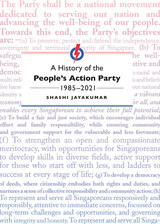
This narrative history of the PAP follows the story through decisions made by party leaders as they sought to respond to the changing demands and expectations of the Singapore electorate over a thirty-year period that saw Singapore enter the ranks of developed nations. The focus is on change in four dimensions: in the communications methods and styles the party adopted, the mechanisms it developed for managing institutional change, the sometimes vexed question of party renewal, and the evolution of economic and social policy. Drawing on internal party documents and multiple interviews with key leaders over the course of a decade, this book provides a detailed portrait of a robust political institution and establishes a distinctive new narrative of Singapore politics.
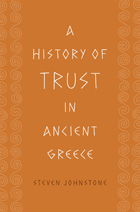

This second volume in the History of Wisconsin series introduces us to the first generation of statehood, from the conversion of prairie and forests into farmland to the development of cities and industry. In addition, this volume presents a synthesis of the Civil War and Reconstruction era in Wisconsin. Scarcely a decade after entering the Union, the state was plunged into the nationwide debate over slavery, the secession crisis, and a war in which 11,000 "Badger Boys in Blue" gave their lives. Wisconsin's role in the Civil War is chronicled, along with the post-war years. Complete with photographs from the Historical Society's collections, as well as many pertinent maps, this book is a must-have for anyone interested in this era of Wisconsin's history.
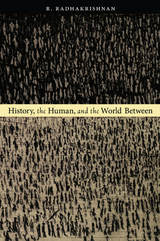
Radhakrishnan develops his rationale of the “between” through three linked essays where he locates the terms “world,” “history,” “human,” and “subject” between phenomenology and poststructuralism, and in the process sets forth a nuanced reading of the politics of a gendered postcolonial humanism. Critically juxtaposing the works of thinkers such as Friedrich Nietzsche, Adrienne Rich, Frantz Fanon, Edward Said, Michel Foucault, Maurice Merleau-Ponty, Martin Heidegger, David Harvey, and Ranajit Guha, Radhakrishnan examines the relationship between systems of thought and their worldly situations. History, the Human, and the World Between is a powerful argument for a theoretical perspective that combines the existential urgency of phenomenology with the discursive rigor of poststructuralist practices.

Hizbu’llah is the largest and most prominent political party in Lebanon, and one of the most renowned Islamist movements in the world. In this book, Amal Saad-Ghorayeb examines the organisation’s understanding of jihad and how this, together with its belief in martyrdom, brought about the withdrawal of Israeli occupation forces from Lebanon in May 2000.
Saad-Ghorayeb explores the nature of the party’s struggle against the West by studying its views on the use of violence against Westerners. Crucially, she also addresses the question of whether Hizbu’llah depicts this struggle in purely political or civilisational terms. The existential nature of the movement’s conflict with Israel is analysed and the Islamic roots of its anti-Judaism is unearthed.
The author explores the mechanics and rationale behind the party’s integration into the Lebanese political system, and sheds light on how it has reconciled its national idenitity with its solidarity with the Muslim umma.
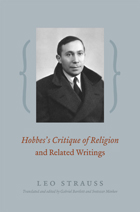
Leo Strauss’s The Political Philosophy of Hobbes deservedly ranks among his most widely acclaimed works. In it Strauss argues that the basis for Hobbes’s natural and political science is his interest in “self-knowledge of man as he really is.” The writings collected in this book, each written prior to that classic volume, complement that account. Thus at long last, this book allows us to have a complete picture of Strauss’s interpretation of Hobbes, the thinker pivotal to the fundamental theme of his life’s work: the conflicting demands of philosophy and revelation, or as he termed it, “the theologico-political problem.”
It is no exaggeration to say that Strauss’s work on Hobbes’s critique of religion is essential to his analysis of Hobbes’s political philosophy, and vice versa. This volume will spark new interest in Hobbes’s explication of the Bible and in his understanding of religion by revealing previously neglected dimensions and motives of Hobbes’s “theology.” At the same time, scholars interested in the intellectual development of Leo Strauss will find in these writings the missing link, as it were, between his two early books,Spinoza’s Critique of Religion and The Political Philosophy of Hobbes.
In addition, this volume makes available for the first time in English a letter, a book outline, an extended review, an engagement with legal positivism, and an account of Strauss’s work on Hobbes by Heinrich Meier, all of which shed light on Strauss’s concerns and his approach to Hobbes in particular, as well as to modern political thought and life.
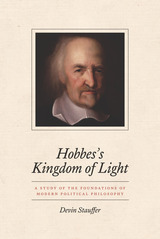
In Hobbes’s Kingdom of Light, Stauffer argues that Hobbes was engaged in a struggle on multiple fronts against forces, both philosophic and religious, that he thought had long distorted philosophy and destroyed the prospects of a lasting peace in politics. By exploring the twists and turns of Hobbes’s arguments, not only in his famous Leviathan but throughout his corpus, Stauffer uncovers the details of Hobbes’s critique of an older outlook, rooted in classical philosophy and Christian theology, and reveals the complexity of Hobbes’s war against the “Kingdom of Darkness.” He also describes the key features of the new outlook—the “Kingdom of Light”—that Hobbes sought to put in its place. Hobbes’s venture helped to prepare the way for the later emergence of modern liberalism and modern secularism. Hobbes’s Kingdom of Light is a wide-ranging and ambitious exploration of Hobbes’s thought.

Megan Feeney argues that the freedom fighting extolled in American World War II dramas and the rebellious values and behaviors seen in postwar film noir helped condition Cuban audiences to expect and even demand purer forms of Cuban democracy and national sovereignty. At the same time, influential Cuban intellectuals worked to translate Hollywood ethics into revolutionary rhetoric—which, ironically, led to pointed critiques and subversions of the US presence in Cuba. Hollywood in Havana not only expands our notions of how American cinema was internalized around the world—it also broadens our view of the ongoing history of US-Cuban interactions, both cultural and political.
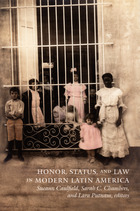
Each essay examines honor in the context of specific historical processes, including early republican nation-building in Peru; the transformation in Mexican villages of the cargo system, by which men rose in rank through service to the community; the abolition of slavery in Rio de Janeiro; the growth of local commerce and shifts in women’s status in highland Bolivia; the formation of a multiethnic society on Costa Rica’s Caribbean coast; and the development of nationalist cultural responses to U.S. colonialism in Puerto Rico. By connecting liberal projects that aimed to modernize law and society with popular understandings of honor and status, this volume sheds new light on broad changes and continuities in Latin America over the course of the long nineteenth century.
Contributors. José Amador de Jesus, Rossana Barragán, Sueann Caulfield, Sidney Chalhoub, Sarah C. Chambers, Eileen J. Findley, Brodwyn Fischer, Olívia Maria Gomes da Cunha, Laura Gotkowitz, Keila Grinberg, Peter Guardino, Cristiana Schettini Pereira, Lara Elizabeth Putnam

Intellectuals “have been both rallying points and railed against in American politics, vessels of hope and targets of scorn,” writes Michael J. Brown as he invigorates a recurrent debate in American life: Are intellectual public figures essential voices of knowledge and wisdom, or out-of-touch elites? Hope and Scorn investigates the role of high-profile experts and thinkers in American life and their ever-fluctuating relationship with the political and public spheres.
From Eisenhower’s era to Obama’s, the intellectual’s role in modern democracy has been up for debate. What makes an intellectual, and who can claim that privileged title? What are intellectuals’ obligations to society, and how, if at all, are their contributions compatible with democracy? For some, intellectuals were models of civic engagement. For others, the rise of the intellectual signaled the fall of the citizen. Carrying us through six key moments in this debate, Brown expertly untangles the shifting anxieties and aspirations for democracy in America in the second half of the twentieth century and beyond. Hope and Scorn begins with “egghead” politicians like Adlai Stevenson; profiles scholars like Richard Hofstadter and scholars-turned-politicians like H. Stuart Hughes; and ends with the rise of public intellectuals such as bell hooks and Cornel West. In clear and unburdened prose, Brown explicates issues of power, authority, political backlash, and more. Hope and Scorn is an essential guide to American concerns about intellectuals, their myriad shortcomings, and their formidable abilities.
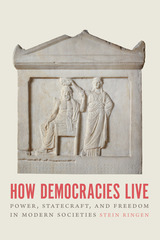
In the new century, the triumph of democracy at the end of the Cold War turned to retrenchment. The core democracies, in America and Britain, succumbed to polarization and misrule. Dictatorships, such as China, made themselves assertive. New democracies in Central Europe turned to muddled ideologies of “illiberal democracy.” In this book, Stein Ringen offers a meditation on what democracy is, the challenges it faces, and how it can be defended. Ringen argues that democracy must be rooted in a culture that supports the ability of citizens to exchange views and information among themselves and with their rulers.
Drawing on the ideas of Machiavelli, Aristotle, Tocqueville, Max Weber, and others, Ringen shows how power is the fuel of government, and statecraft turns power into effective rule. Democracy should prize freedom and minimizing unfairness, especially poverty. Altogether, Ringen offers powerful insight on the meaning of democracy, including a new definition, and how countries can improve upon it and make it function more effectively. Timely and thought-provoking, How Democracies Live is a sober reminder of the majesty of the democratic enterprise.

This book offers a new, interpretive way of understanding organizations and policy by analyzing how they convey meaning through symbolic language, objects, and act. Yanow argues that contested facts in policy often reflect different policy meanings, which are often known tacitly and communicated through the symbols used by an implementing organization.
Yanow argues that policy and organizational actions are often as expressive of group or national identity as they are instrumentally oriented. Drawing on the Israel Corporation of Community Centers as an extended illustration of her arguments, she shows how policy meanings may be communicated to multiple audiences through the agency's actions. Using language, physical artifacts, and acts, Yanow explores how one vision of Israeli identity was communicated tacitly, at a time when Jewish Israeli "ethnicity" was publicly undiscussable. In reading public policies and administrative practices as ways in which a polity constructs and narrates its identity, Yanow shows how the case example raises questions of what it means to be a "good" Israeli.
Unlike most policy studies which consider organizations within a void, How Does a Policy Mean? puts policy in a societal context. Yanow's interpretation of the policy process extends beyond the field of public policy to examine the way organizations establish identity and image for themselves and for the wider public. Her analysis will be of value to those involved in political science, public administration, and organizational studies.
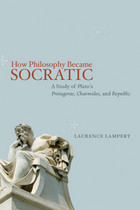
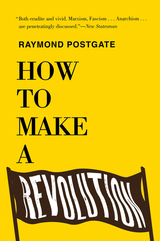
The first third of the twentieth century saw a seismic upheaval in global politics and society that still reverberates today. Communism and fascism toppled both traditional monarchies and representative democracies, while trade unions and other factions effectively challenged existing governments to adopt reforms or face crippling economic or social upheaval. Given these extraordinary events, Raymond Postgate set forth in How to Make a Revolution to objectively discuss revolutionary methods, and which tactics or strategies are the most effective. Drawing on his own idealistic experience as a young labor agitator and editor of a communist newspaper and more than fifteen years of close study of past revolutionary history and theories, the author dispassionately discusses Marxism, fascism, anarchism, and Blanquism (a doctrine within socialism), as well as syndicalism and industrial unionism. He then reviews revolutionary practice, including general strikes, financial pressure, armed revolution, and communist tactics, and ends with a prescient and frightening conclusion: without general consensus and determination, a peaceful revolution is impossible, and “if no action is taken, action of another kind will be taken for us. . . . The continuance of uncertainty will mean that the disillusioned will drift steadily across to a Fascist organization. Fascism means war; the character of a Fascist State is fairly well known. Once it is established, those who read, who write, who publish or who print, books like this are likely to be dead or in concentration camps.” Originally published in 1934, Postgate’s book was heralded for its clarity and scholarship.

A work of striking originality, The Human Condition is in many respects more relevant now than when it first appeared in 1958. In her study of the state of modern humanity, Hannah Arendt considers humankind from the perspective of the actions of which it is capable. The problems Arendt identified then—diminishing human agency and political freedom, the paradox that as human powers increase through technological and humanistic inquiry, we are less equipped to control the consequences of our actions—continue to confront us today. This new edition, published to coincide with the sixtieth anniversary of its original publication, contains Margaret Canovan’s 1998 introduction and a new foreword by Danielle Allen.
A classic in political and social theory, The Human Condition is a work that has proved both timeless and perpetually timely.

Human Nature and History, a monumental work in two volumes, is an attempt to analyze these relations. It is a work in meta-theory or the theory of political theory.
At the most general level, Cumming is concerned with the question of what is involved in the enterprise of political theory or political philosophy and how different conceptions of that enterprise have developed historically. More specifically, he is concerned with the format imposed on the historical development of political thought by Anglo-American liberalism, especially as represented by John Stuart Mill.
Since Cumming traces the development of political theory by reference to the relation between its subject-matter and other subject-matters, his study should be of interest to historians of thought and culture, as well as to political theorists and philosophers.
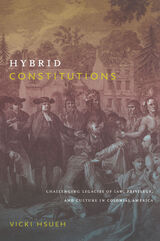
Hsueh traces the historical development and theoretical implications of proprietary constitutionalism by examining the founding of the colonies of Maryland, Carolina, and Pennsylvania. She provides close readings of colonial proclamations, executive orders, and assembly statutes, as well as the charter granting Cecilius Calvert the colony of Maryland in 1632; the Fundamental Constitutions of Carolina, adopted in 1669; and the treaties brokered by William Penn and various Lenni Lenape and Susquehannock tribes during the 1680s and 1690s. These founding documents were shaped by ambition, contingency, and limited resources; they reflected an ambiguous and unwieldy colonialism rather than a purposeful, uniform march to modernity. Hsueh concludes by reflecting on hybridity as a rubric for analyzing the historical origins of colonialism and reconsidering contemporary indigenous claims in former settler colonies such as Australia, New Zealand, and the United States.
READERS
Browse our collection.
PUBLISHERS
See BiblioVault's publisher services.
STUDENT SERVICES
Files for college accessibility offices.
UChicago Accessibility Resources
home | accessibility | search | about | contact us
BiblioVault ® 2001 - 2024
The University of Chicago Press









